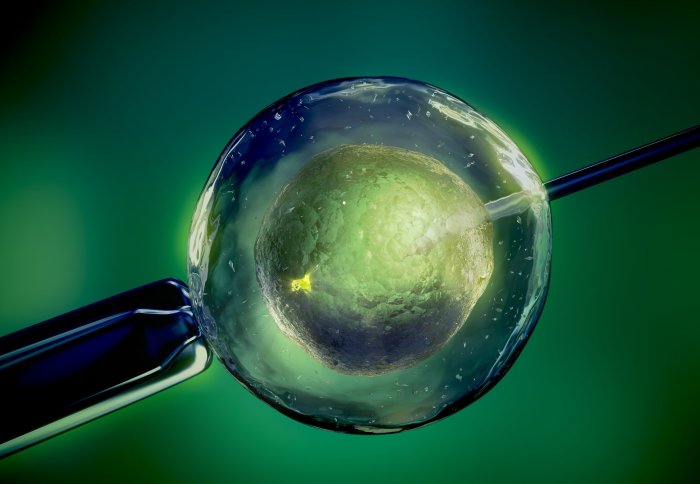Kisspeptin hormone could make IVF safer for mothers
by Sam Wong

The first woman to have IVF treatment using a pioneering new method developed at Imperial College London has given birth to a baby boy.
The new technique uses the natural hormone kisspeptin to stimulate egg development instead of the usual fertility drugs. Doctors hope using kisspeptin will give mothers a lower risk of ovarian hyperstimulation syndrome (OHSS), a potentially life-threatening condition that can be triggered by IVF drugs used now.
Suzannah Kidd, who gave birth to baby Heath at Hammersmith Hospital in April, is one of 30 women who have had IVF treatment with kisspeptin in a clinical trial funded by the Medical Research Council and the National Institute for Health Research. The results were presented this week at the Endocrine Society’s annual meeting in San Francisco.
“We have shown that kisspeptin can be used effectively in patients undergoing IVF treatment to more naturally stimulate the release of reproductive hormones and result in a healthy baby,” said Professor Waljit Dhillo from Imperial College London, who led the study. “The results of the study are very encouraging and whilst we are primarily looking at women most at risk of developing OHSS, there is the potential that kisspeptin could be used across all IVF treatments as a more natural alternative.”
Dr Geoffrey Trew, Consultant in Reproductive Medicine and Surgery at Hammersmith Hospital, said: “We’re absolutely thrilled that this study has resulted in the birth of a healthy baby boy. Each year, thousands of couples in the UK start families using IVF treatment and if we can work towards eliminating the risk of OHSS, using the naturally occurring hormone kisspeptin, we can hopefully help even more women and make the treatment potentially safer. This is a very exciting breakthrough.”
It is estimated that about 45,000 cycles of IVF are performed in the UK each year. Five per cent of women who undergo IVF develop moderate symptoms of OHSS, with severe cases occurring in less than half of one per cent. Women with polycystic ovary syndrome (PCOS) are most likely to develop OHSS.
Kisspeptin is produced in the brains of men and women and triggers the development of secondary sexual characteristics during puberty.
In the trial, kisspeptin successfully induced egg production during IVF treatment in 29 of the 30 women and embryos developed in 28. Eleven of 25 participants who had an embryo transfer were pregnant 12 days later.
The team at Imperial are keen to hear from women interested in taking part in studies using kisspeptin as part of IVF treatment. Please contact: kisspeptin.ivf@imperial.ac.uk
Article supporters
Article text (excluding photos or graphics) © Imperial College London.
Photos and graphics subject to third party copyright used with permission or © Imperial College London.
Reporter
Sam Wong
School of Professional Development